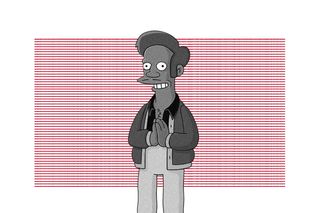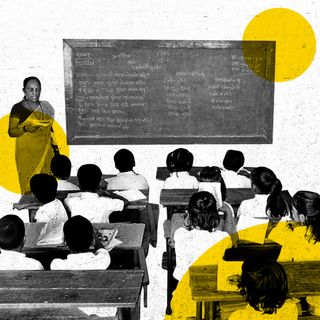
‘The Simpsons’ Actor Who Voiced Apu Apologizes to Indians for Stereotypical Portrayal
The show was founded on good intentions, Hank Azaria said, but it contributed to the “structural racism” in the U.S.

American actor Hank Azaria, who voiced an Indian immigrant character in The Simpsons named Apu Nahasapeemapetilon, apologized for his racially insensitive depiction. Azaria stepped down last year from the show, after voicing Apu for 30 years, in light of fervent criticism around the way the show stereotyped Indians and perpetuated bias.
Apu was the Indian American shopkeeper on the long-running American sitcom, which started in 1989. As an immigrant from West Bengal, his recurring character was saddled with an exaggerated accent, name, and personality traits. Story arcs surrounding him tapped on common prejudices around immigrants and particularly those from the South Asian community; one episode in 1996 shows Apu purchasing a forged birth certificate from a local mobster after the mayor sought to expel undocumented migrants. His character became the subject of Indian-American comedian Hari Kondabolu’s ire in a 2017 documentary titled The Problem With Apu, which looked at the stereotypical lens Western culture puts on South Asian communities.
Azaria admitted the pernicious impact the portrayal had: Apu, he said, had “become a slur” in American communities. “Just because there were good intentions, it doesn’t mean there weren’t real, negative consequences to the thing that I am accountable for.” He added that he would like to go to each Indian and apologize to them.
The layered problem with his character, and similar versions on other shows, is part of a broader reckoning around race, representation, and minority communities over the last few years. Western shows — and by extension Western cultures — have long been guilty of racially and ethnically stereotyping and typecasting actors from minority communities. Caricatured accents, dramatized costumes, stale cultural tropes — all directed for a comic effect, mind you — end up making a mockery of these communities and their people. “We didn’t have any other representation in this country. That creates a problem when the most popular show on television is showing mainstream America what an Indian is,” actor Utkarsh Ambudkar says The Problem With Apu.
Related on The Swaddle:
Mindy Kaling’s ‘Never Have I Ever’ Caricatures Indianness, Glorifies Clichés
While the apology is appreciated, this is not about Azaria, as much as it is about the principle he wants to stand by. Dana Schwartz noted in Entertainment Weekly that the problem with Apu was more than a brown character voiced by a white actor, and it wasn’t just about The Simpsons the problem was “… with its viewers, the drunk idiots on the street who call any South-Asian person ‘Apu’ and who repeated ‘Thank you, come again,’ as a mocking refrain.” At the heart of this is a complex conversation: what does it mean to have a white actor voicing an Indian character during a time when there was next-to-no Indian representation in the media? And the next logical question should then be: should a member from a traditionally mainstream community be the face of any story, character, or idea concerning a minority group? The short answer is no.
The long answer takes the scenic route involving a hotly debated ideology that perches on artistic freedom. One side opines that art shouldn’t bear a social burden; its integrity should be kept out of bounds, meaning that the question of representation should not arise in the first place. On the opposite end of the spectrum is the argument about inclusivity, which acknowledges that all social burdens are systemic and require a coordinated, concerted engagement; art can and should be a tool for social change, in other words. When American actor Alison Brie, who voiced Diane Ngyuen, a character of Vietnamese descent, on BoJack Horseman, made an apology similar to Azaria’s, there were thus two opposite reactions.
Others have dismissed this quest for representation and authenticity as a ‘trend’ — a controversy that attracts eyeballs, jumps on the ‘politically incorrect’ bandwagon, but eventually amounts to nothing. But representation and inclusivity can never be a fad. Kondabolu’s response to Azaria’s apology is interesting to look at here; the comedian labeled the awareness a “comeuppance.” “The ‘Apu Controversy’ is not real,” Kondabolu tweeted. “Racism isn’t ‘controversial’, it’s a constant. Unless you think People of Color finally standing up for themselves is ‘controversial’. However, I suppose a word like ‘controversy’ is more clickable than ‘comeuppance’.”
One could also argue that it’s all parody. The Simpsons, for instance, is supposed to be a satire that depicts the ‘generic’ American life with all of its glaring problems — attitudes towards immigrants being one of those. But the generalities now feel archaic, especially if they come at the expense of the safety and dignity of a community; the world today is much different than what was when The Simpsons first aired. Every conversation, each system is a product of class, caste, race, ethnic bias. Parodies and satires are riveting literary genres: they make a point without actually saying it, keep it light, and know better than to preach. But even they are within the scope of an artistic cost-benefit analysis: does the harm their content causes outweigh the intended comedic effect? And if any art — shows, music, movies, books, audio — finds itself asking this question, it must dig deeper.
If the first step is to accept that something is disrespectful and hurtful, the next step is to act around this realization. In June 2020, following the George Floyd protests in the U.S., The Simpsons’ creators announced they will no longer have non-white characters voiced by white actors. There is learning at the root of this discourse, one that encourages people to grow and not simply submit to being a mere product of their time. And arguably, the onus on growth and relearning should also fall on the show creators and other dominant institutions.
Jason Parham writes in WIRED that while television is trying to be more inclusive now, it still has a long way to go. When in doubt, always go for more equality and representation, we say.
Saumya Kalia is an Associate Editor at The Swaddle. Her journalism and writing explore issues of social justice, digital sub-cultures, media ecosystem, literature, and memory as they cut across socio-cultural periods. You can reach her at @Saumya_Kalia.
Related


Why the 1970s’ German ‘Rasputin’ Song Is India’s Newest Way To Resist Hate
